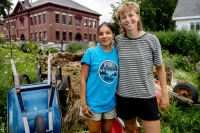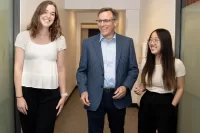
Vova Sosnovskii ’26 of St. Petersburg, Russia, worked in a Bates lab, contributing to the study of the rotavirus and its potential antiviral interventions. His summer experience deepened his sense of purpose and the connection between his two fields of study, biochemistry and economics.
Funded by a Purposeful Work internship, Nimco Jama ’24, a biology major from Hargeisa, Somaliland, interned at Trinity Jubilee Center in Lewiston, helping to bridge language barriers. The exposure to the challenges faced by under-served communities left her in awe of the local community’s dedication to supporting one another.
Lucy Whitelam ’26, a prospective dance major from Reading, Mass., took dance classes through the Bates Dance Festival’s Professional Training Program, expanding on the training she received during her first year at Bates and feeling “grateful to be surrounded by so many people who push and inspire one another.”
These and other Bates students profiled here gained valuable skills, learned to adapt to challenges, and discovered new facets of their fields during the summer work. Through internships, research, and community engagement, each student found a deeper sense of purpose and direction, whether it was contributing to public health, advocating for marginalized groups, or exploring the intersections of their academic interests.
The summer was marked by growth, reflection, and connections – a testament to the power of the liberal arts and science to shape these students’ academic journeys and aspirations.
Student: Vova Sosnovskii ’26, a prospective biochemistry and economics double major from St. Petersburg, Russia
Place and Purpose: The Banks Lab, Bonney Science Center, Bates College, as a grant-funded research assistant
The Job: Sosnovskii worked in the lab of Assistant Professor of Biology Lori Banks, continuing the lab’s work to better understand the human rotavirus.
The Story: Among the many viruses that cause human illnesses, two hit the stomach hard. One is the norovirus and the other, the subject of study in the laboratory of Assistant Professor of Biology Lori Banks, is the rotavirus, responsible for the death of half a million children each year.
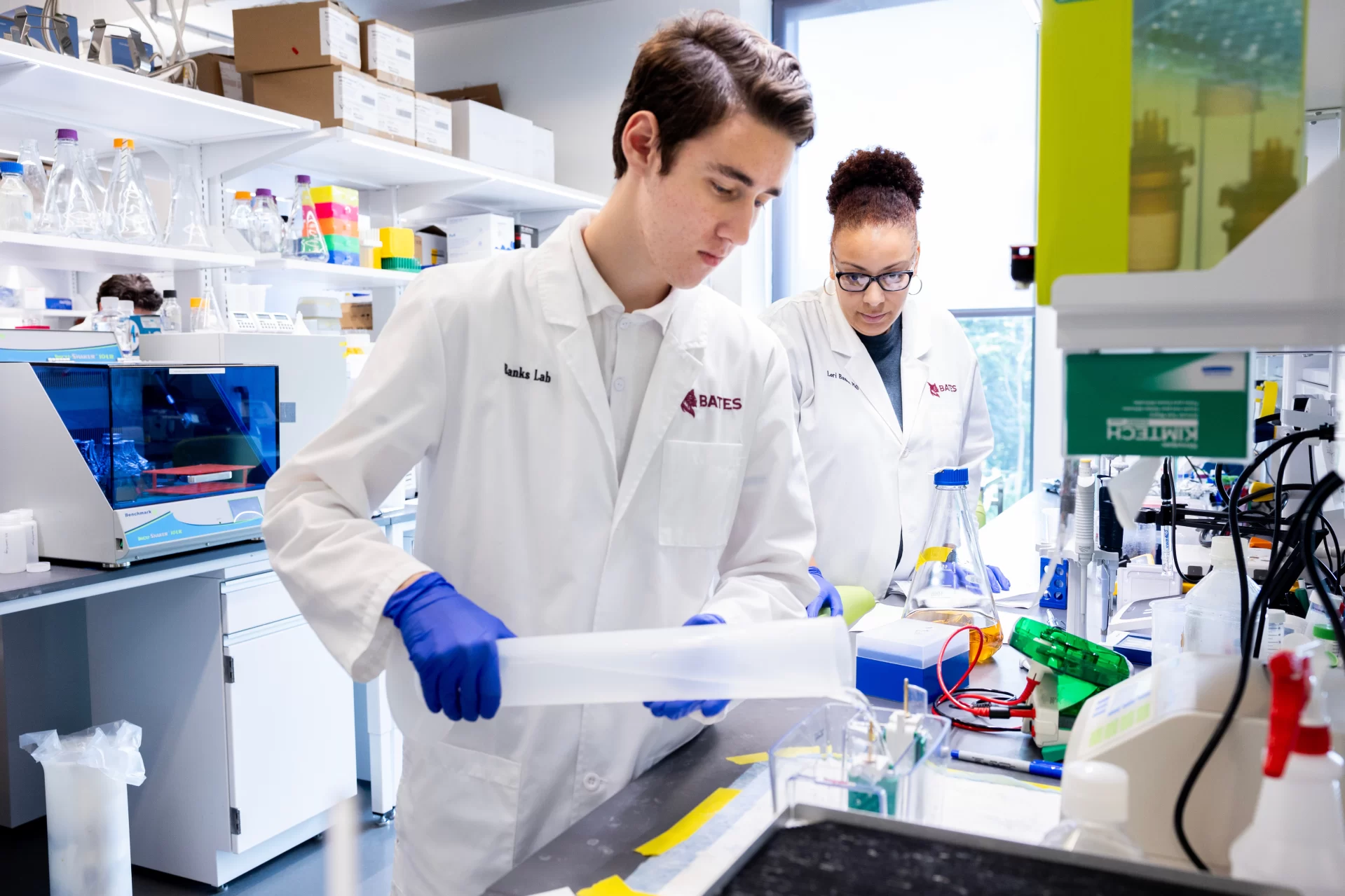
The Banks lab is currently trying to find a way to target a specific protein, NSP4, which allows the virus to cause gastroenteritis and its debilitating symptoms of diarrhea and fever.
The work, says Sosnovskii, has given him “a clearer sense of purpose in my work. By contributing to the development of antiviral interventions for rotavirus, I was directly impacting public health and potentially saving thousands of lives. This realization was a powerful motivator.”
Sosnovskii gained advanced lab skills in molecular biology, such as E. coli transformation, where tiny bits of DNA get inserted into the bacteria, modifying its genetic makeup so researchers can study how genes work.
Sosnovskii sees a connection between his two prospective majors, biochemistry and economics. “Successfully developing an antiviral intervention for rotavirus could have significant economic implications, such as reducing healthcare costs, improving productivity by reducing illness-related absences, and potentially creating a more efficient healthcare system.”
As for Banks as a lab mentor, she was supportive “from lab experiments to providing snacks. She’s dedicated to our success and well-being,” Sosnovskii said.
Student: Nimco Jama ’24, a biology major from Hargeisa, Somaliland
Place and Purpose: Trinity Jubilee Center, Lewiston, as a public health intern
The Job: Armed with a funded Purposeful Work internship, Jama served at Trinity Jubilee Center, a secular community center providing comprehensive support in downtown Lewiston through a soup kitchen, food pantry, diaper bank, day shelter, medical clinic, resource center, and refugee integration program.
The Story: Jama supported the center’s free walk-in clinic. Shadowing a doctor, Jama helped lower the language barriers that her community struggles with. “As a Somali student, I was able to help interpret for Somali patients, while learning more about the basic procedures that a doctor goes through with each patient.”
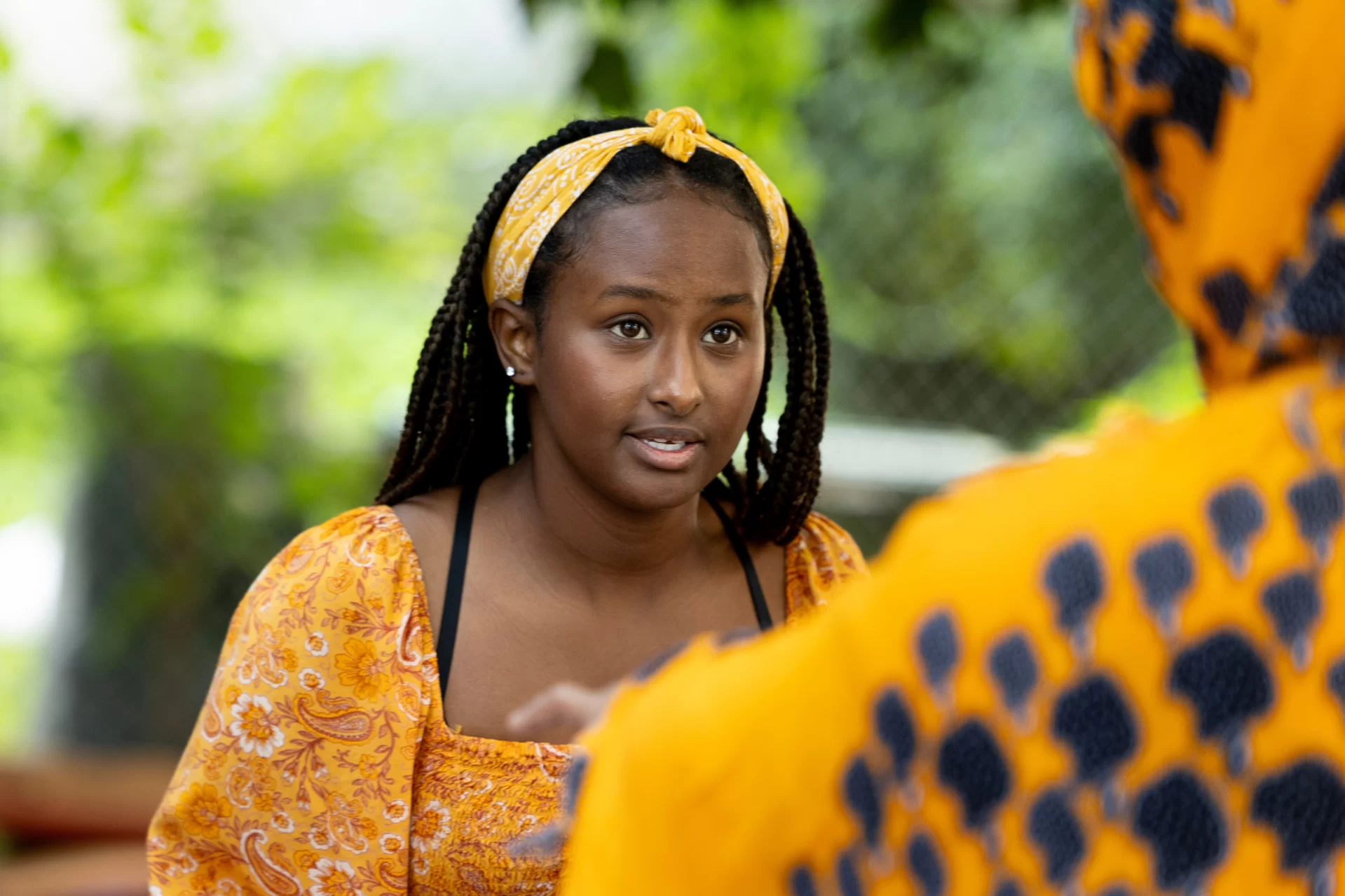
At other times of the week, Jama helped register families to receive resources “like fresh fruits and vegetables and working at the food pantry as an interpreter. It’s important that every family gets what they need, and language barriers often get in the way of that.”
The experience left Jama “in awe of how much everyone in Lewiston gives back to the community. I have met high school teachers who spent their summers volunteering and supporting the shelter. It’s been incredible to see how close-knit the community is.”
At the same time, Jama is aware of the privilege that comes with being a Bates student. “I want to keep connecting with the community and continue learning from them.”
A tenet of Purposeful Work is to reflect on how her experience fits with her own sense of what feels purposeful. “To me, purposeful work means engaging with challenges in a more holistic way, and that’s exactly what Trinity Jubilee does. There’s a food pantry and a walk-in clinic on Thursdays. But there are also employees who help the community with job searches. Additionally, there’s donated resources that are given out whenever someone needs them. And on top of all that, the shelter’s soup kitchen makes lunch everyday for over a 100 community members.”
The experience has honed her sense of how her future work might fit with what she felt at the center. “I went into the internship thinking that public health in general was what I wanted to pursue. But this internship has shifted me in the direction of nursing school,” she said. “I would like to work toward getting more education in the medical field, but also mix it with social work so that I can make myself useful in two entirely different fields.”
Pursuing multiple career paths, she says, “are very useful, sometimes even necessary!”
Student: Aneeza Ahmad ’25, an environmental studies and philosophy double major from Sharon, Mass.
Place and Purpose: Dirigo Solar, Portland, Maine, as a development intern
The Job: With her funded Purposeful Work internship, Ahmad helped Dirigo Solar in its work with local landowners, towns, and small businesses to co-locate solar power, including researching and summarizing recent solar policy, designing an educational one-pager in Canva, and conducting a project to determine the opportunity for solar in certain Maine communities of focus using different mapping tools.
The Story: All politics is local, said Tip O’Neill, a truism that Amhad learned over the summer when attending a city council meeting in Augusta, Maine, to hear discussion and debates about a solar project.
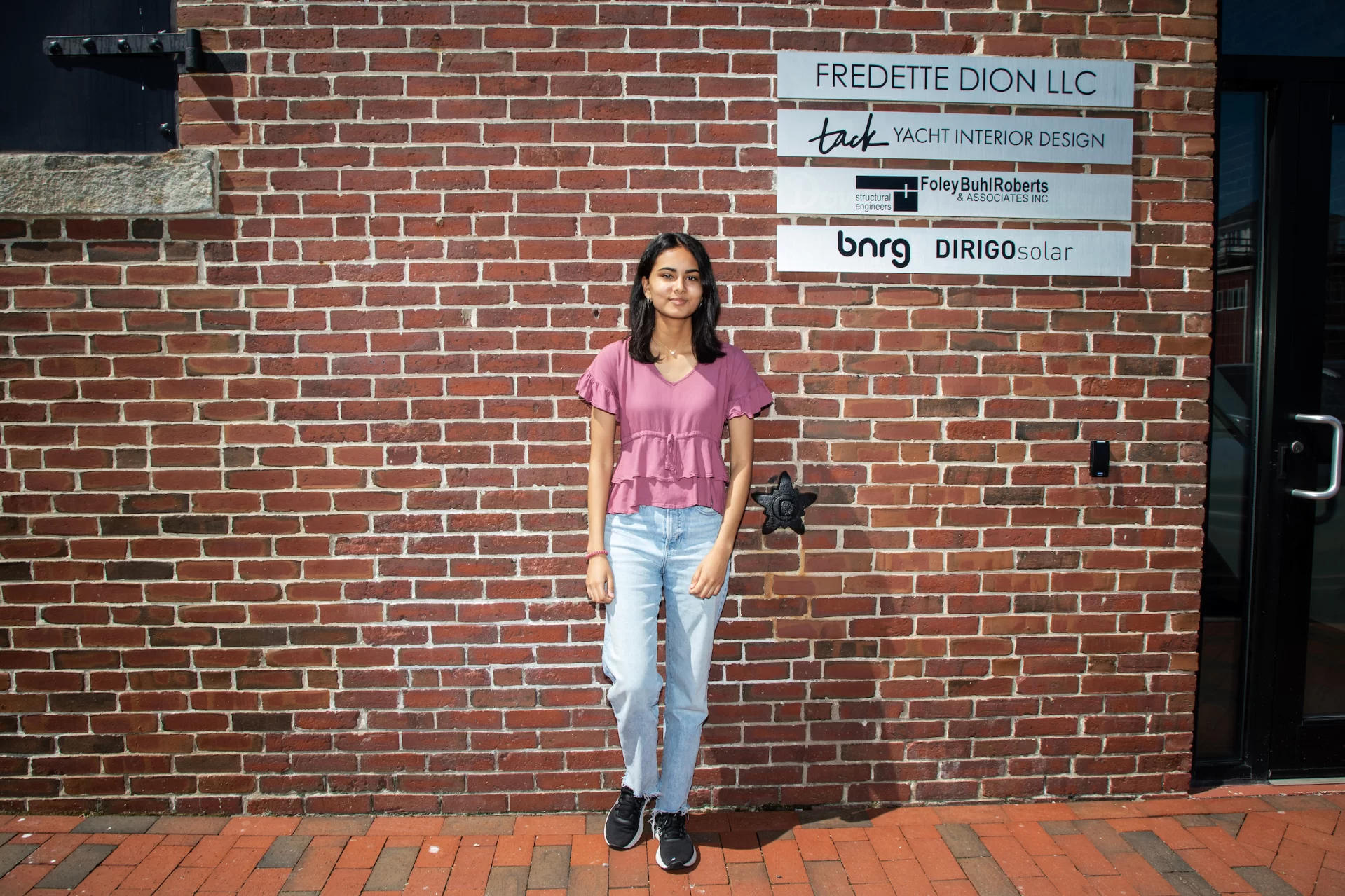
“This experience opened my eyes to the complexities of local governments and the role they play in shaping Maine’s future. Policy isn’t only important higher up; a lot of exciting things happen at the local level, too.”
A highlight was getting into the field to see a solar array under construction, two and a half hours north of Portland. “In the office, everyone is working to develop these projects — permitting, talking to the landowners, doing the stuff behind the scenes.”
Like donning a hard hat and a reflective vest, and visiting what used to be a landfill, “to see like actual work being done in the trucks and the tractors and panels and boxes that are gonna get installed. So that was cool.”
She learned about herself, too. “Interning at Dirigo confirmed for me that I am a very mission-driven person. I want to engage in work that helps further a goal I believe in — in this case, to help build a clean energy future for the state of Maine. I found great purpose in this mission, and it was a joy to work with such a passionate team of people committed to the same idea.”
As an environmental studies major, Ahmad has gained “high level, theoretical knowledge about environmental issues and renewable energy.” Interning at Dirigo was a complementary experience. “I have real experience to connect my coursework to. It’s been incredibly valuable to see how the industry works with my own eyes.”
Student: Izzy Beck ’25, a politics major from Montclair, N.J.
Place and Purpose: Maine Immigrants’ Rights Coalition, Portland, Maine, as a communications and policy intern
The Job: With her Purposeful Work-funded internship, Beck worked with other organizations to promote state and federal legislation and communicate with the coalition’s member organizations.
The Story: Most of Beck’s work consisted of writing briefs and reports pertaining to immigration policy in Maine, particularly in Cumberland County, for the Maine Immigrants’ Rights Coalition’s 100-plus member organizations.
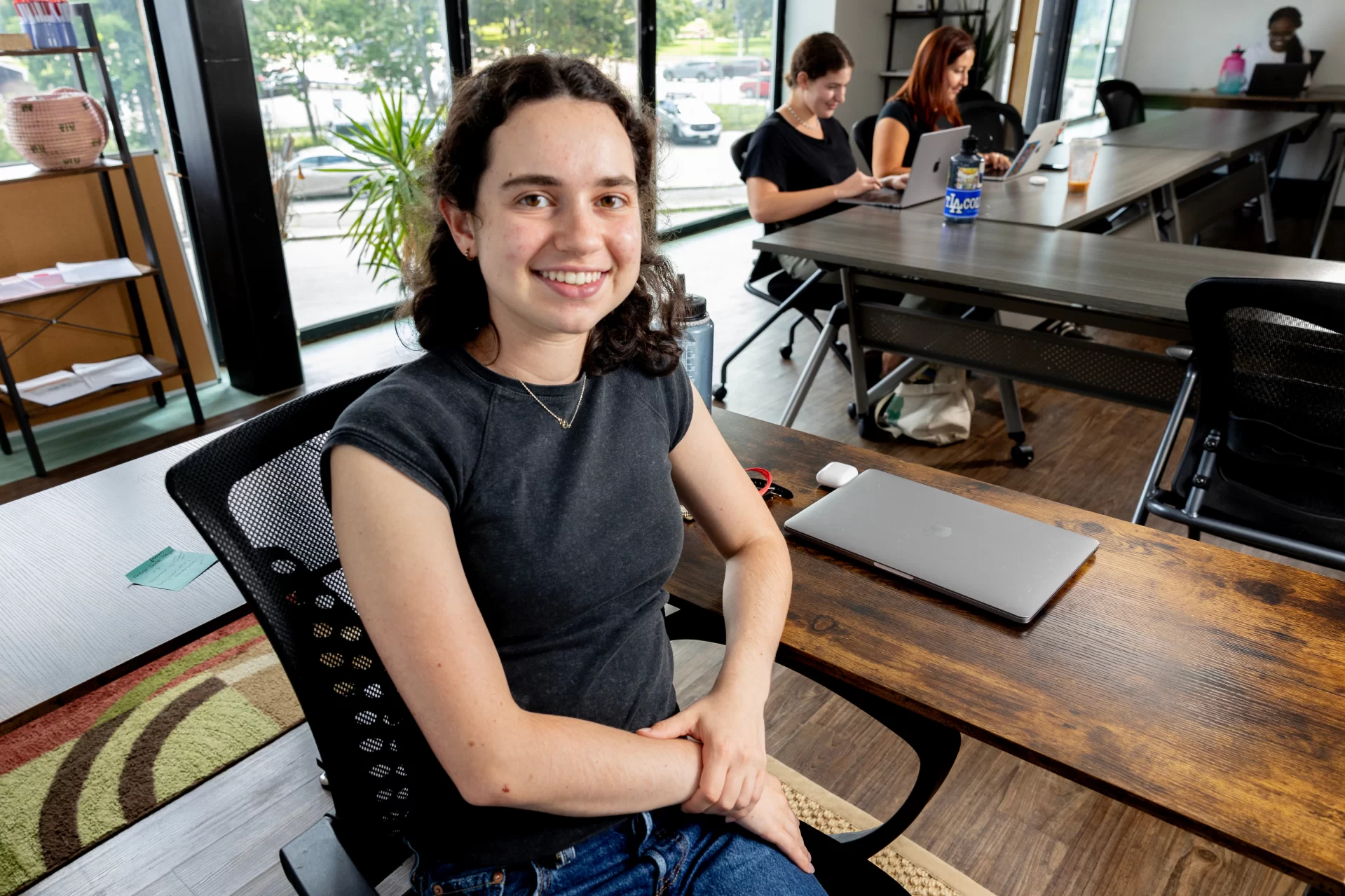
At a protest in June at the Portland Expo, Beck documented how some of the 270 asylum seekers living at the Expo were protesting the temporary emergency shelter for asylum seekers. They voiced concern about uninhabitable living conditions, including expired food, a lack of warm water and showers. Beck chronicled all of it, as well as the asylum seekers’ protests over a lack of access to permanent housing, opportunities for employment, inadequate transportation and local translators.
Beck documented how Portland Mayor Kate Synder and other local politicians listened and then responded to the Expo residents’ concerns at the rally.
“This protest helped me understand why the work that I was doing was so important,” Beck said. “My work of sharing information and raising awareness about conditions faced by asylum seekers in Portland was my way of advocating for a group of people that has historically been marginalized in our society. I saw firsthand the inequities faced by immigrants in our community. And I developed a better understanding of the importance of representation in government.”
Student: Alan Wang ‘24, a politics major from Yinchuan, China
Place and Purpose: The Maine State Archives in Augusta, working as an intern with the Department of the Secretary of State
The Job: Wang helped the Maine State Archives with various projects and assisted the Secretary of State’s office by participating in community engagement events and sitting in on Legislature sessions.
The Story: Somewhere in Maine, there’s a newly married couple who owe a tiny bit of their legal union to a Bates student from China.
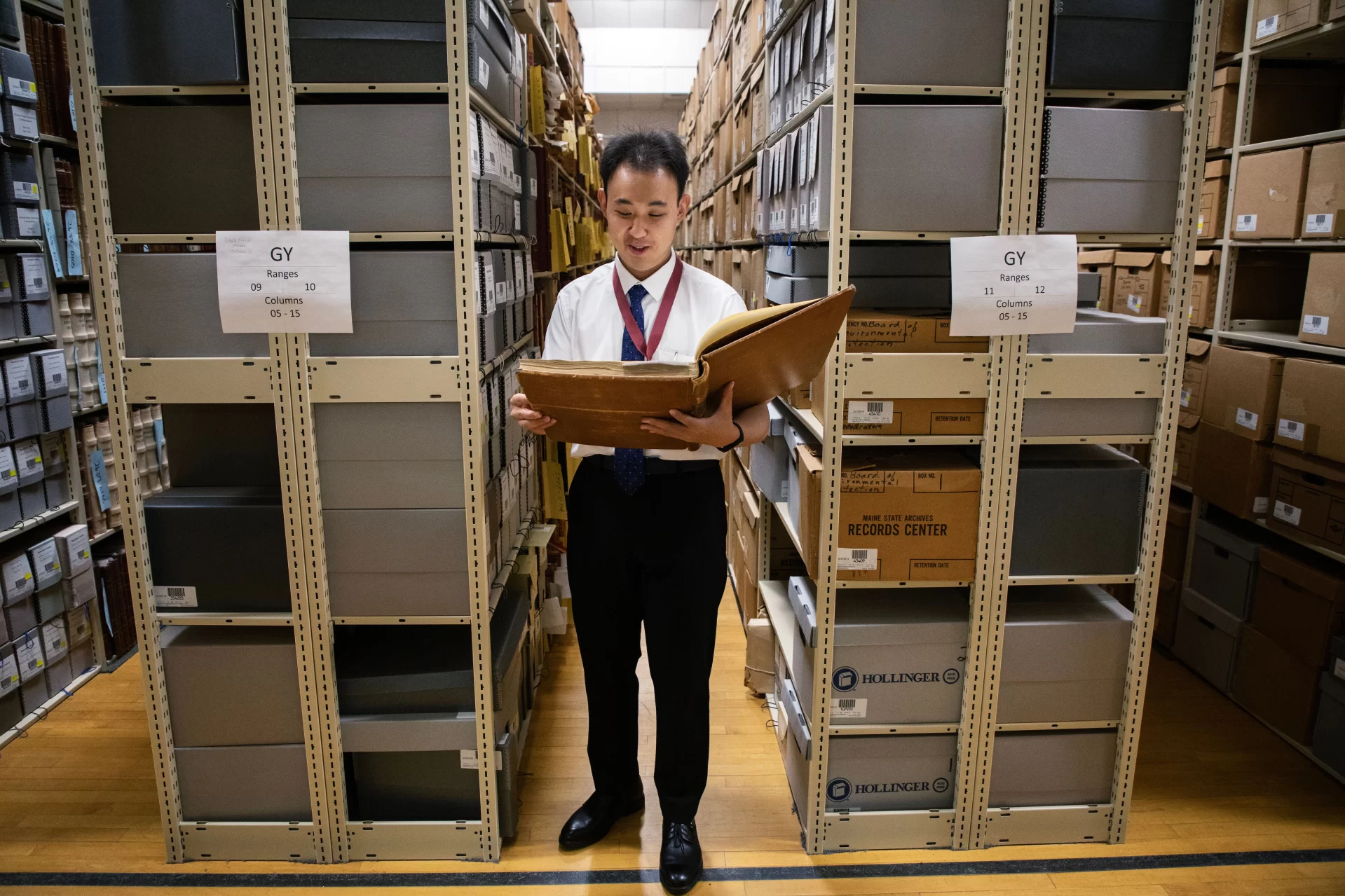
Wang spent the summer working for the Secretary of State, which oversees the Bureau of Corporations and Elections & Commissions. One of Wang’s projects at the bureau was to prepare official certificates for officiants to perform legal marriages in Maine. “I’ve helped all over the place,” Wang said.
Wang pursued the internship after meeting Secretary of State Shenna Bellows last October at Bates, where she spoke about free and fair elections in Maine. “The Secretary of State oversees all elections. I did not know that. Because I major in political science, elections are a major theme, which is why I’m here.”
Most of his summer was spent working in the Maine State Archives.
“It was challenging when I started because everyone assumes a certain level of familiarity to Maine history. I didn’t even know Maine was once part of Massachusetts. But I returned to my residence the same day and gave myself a crash course on Maine history.”
The archives maintains roughly eight miles of official State records, including the original state constitution, reported election results, legislative bills, and policies and research created by state agencies.
Wang helped to process incoming records, which means to arrange, organize, describe, and make accessible those materials.
“There were people asking the archives about a list of Maine lumber sites in 1970s, but that information was in boxes that are still waiting to be processed,” said Wang. “And that is what I’m doing. If I happen to sort through that box, then that person’s question can get answered. Whereas if nobody does anything, questions can never be answered.”
Student: Keira January ’25, a history major from Maplewood, N.J.
Place and Purpose: The Frances Perkins Center and Homestead National Historic Landmark in Newcastle, Maine, as a Purposeful Work-funded intern.
The Job: January worked at the center greeting visitors, leading tours of the homestead, and conducting research about Frances Perkins.
The Story: American workers’ rights advocate Frances Perkins was the first woman to serve in a U.S. presidential cabinet, serving from 1933-1945 as the longest-serving Secretary of Labor.
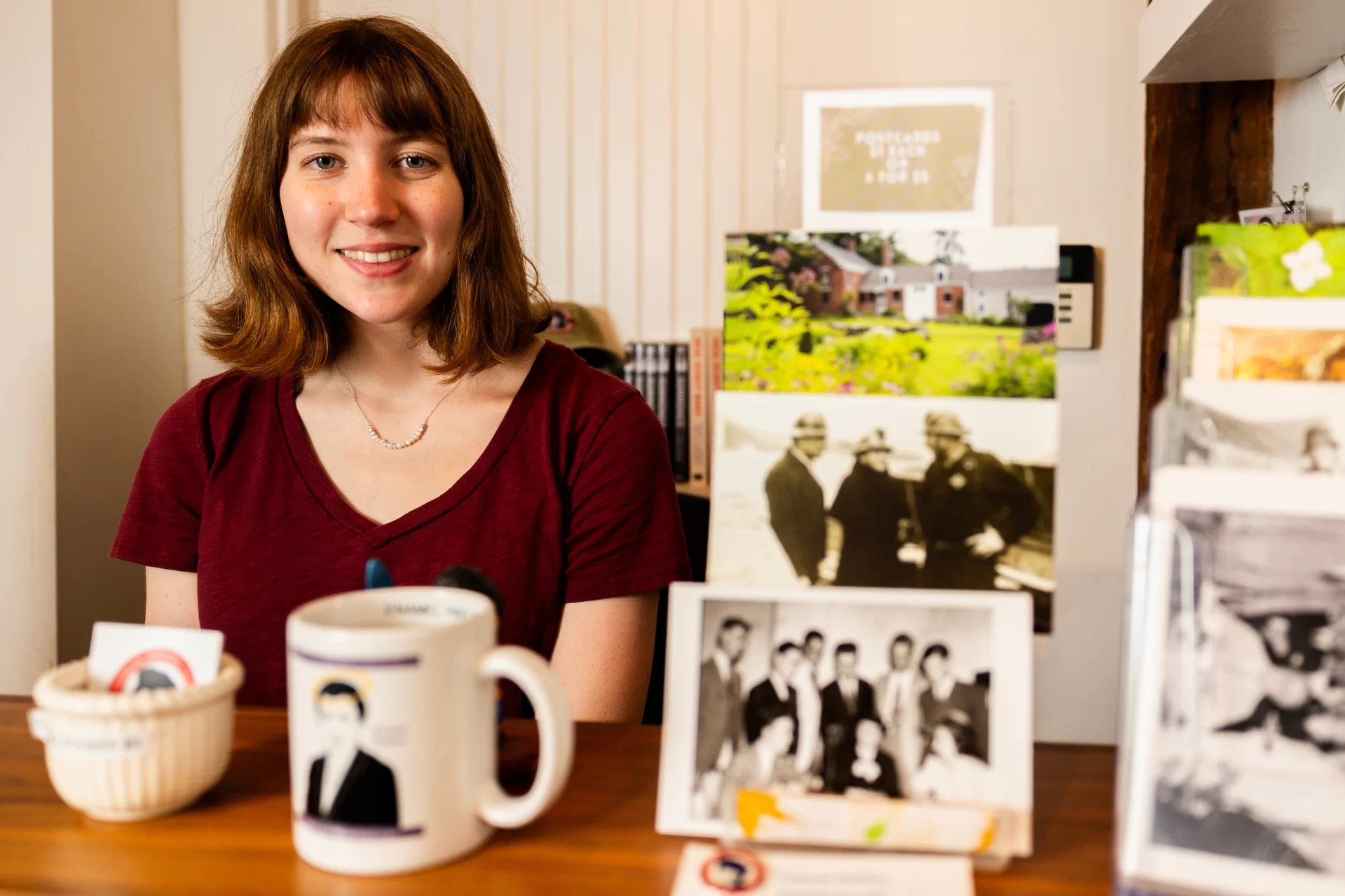
Through exhibitions, homestead tours, public lectures, and educational outreach programs, the Frances Perkins Center seeks to share Perkins’ commitment to public service and continue to find solutions to social and economic issues.
The tours were especially “challenging,” said January, since as a tour guide, she had to memorize information and be ready for unexpected questions. As she spent more time learning and navigating the homestead, the tours got easier to lead, and she gained confidence in her knowledge.
“I have learned that I really enjoy connecting with people and making their experiences better,” she said. “It was really great to see the impact of our work in such an obvious way. I also learned a lot about labor history and workers’ rights, and now know that I would want to look more into this in the future.”
Soaking in the life and surroundings of a 20th century historical figure helped January pinpoint the chronological focus of her history major to modern history, “especially labor history and immigration history. I am interested to see how these will appear in my future classes.”
Student: Nina Greeley ’24, a biochemistry major from Scarborough, Maine
Place and Purpose: Lindsey R.F. Backman’s Lab at MIT’s Whitehead Institute as a summer undergraduate researcher
The Job: Performing research focusing on understanding how bacteria abundant in the human microbiome protect oxygen-vulnerable enzymes that they rely on for survival.
The Story: Funded by a Purposeful Work internship, Greeley found herself enthralled by the dynamic world of research. “Lab-based research,” she said, “often fails, but resilience is a scientist’s critical trait.”
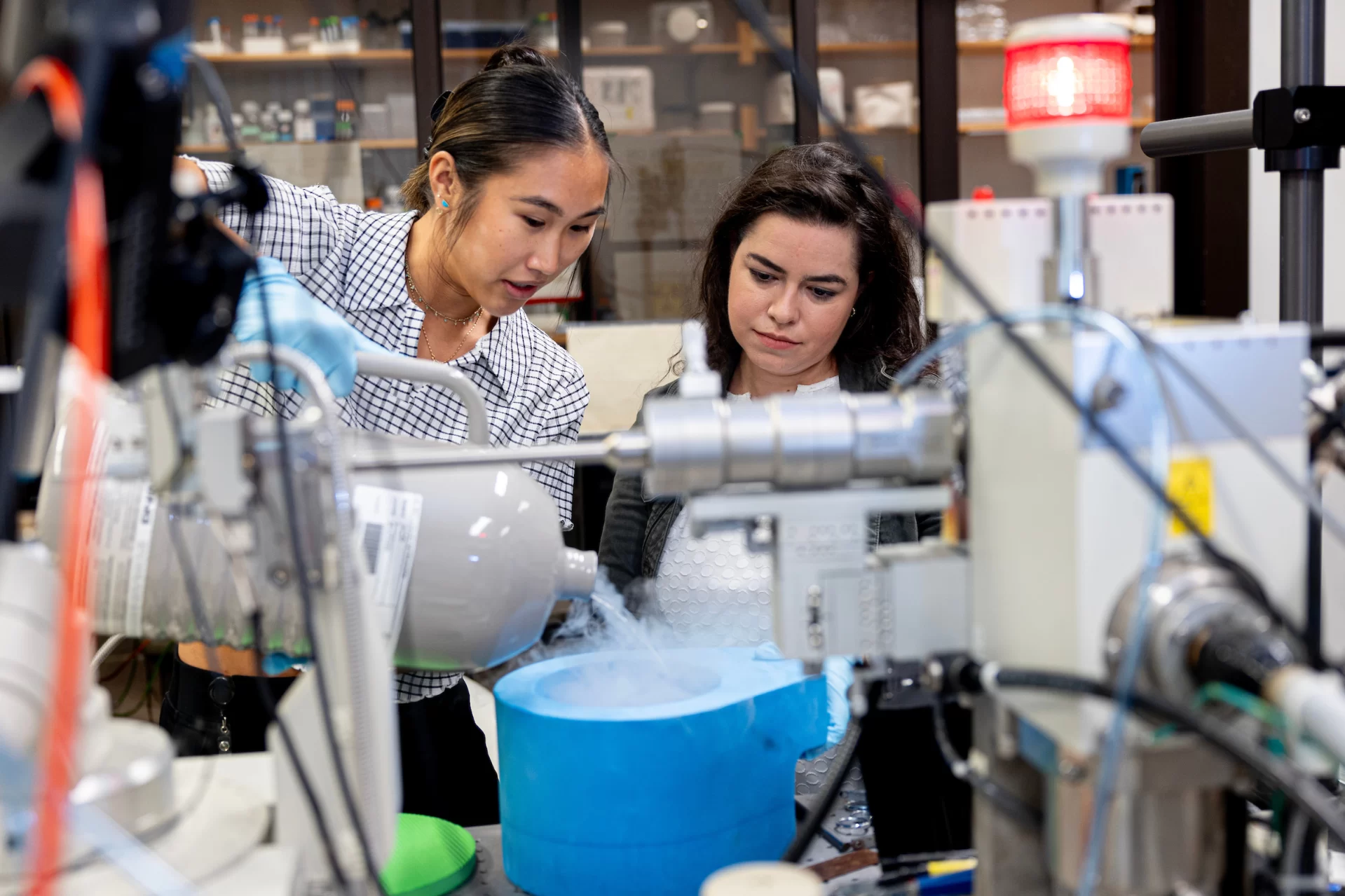
As part of MIT’s Summer Research Program, Greeley spent lab time looking at bacterial microcompartments, otherwise known as BMCs, which are cellular structures in bacteria, such as E. coli, that encapsulate specific metabolic processes. “I scrutinized papers, led a lab group meeting, and presented my research at the program’s poster session to students, faculty, and families.”
The failure she encountered was when E. coli strains that she was trying to grow under BMC-forming conditions “kept dying.” So she developed what’s known as a bioinformatic analysis pipeline, which offered a solution. “I identified and grew 16 strains successfully under these particular conditions,” she said. “Lucky for me!”
Those trials cemented her longing for scientific excellence. “I aspire to contribute where the best science happens,” Greeley said.
The experience also pointed her toward what feels purposeful to her. “Modern science propels human progress,” she said. Down the road, she wants to study currently unsolved biological problems. Back on campus, she will pursue her senior thesis, collaborating with Associate Professor of Chemistry and Biochemistry Jennifer Koviach-Côté to synthesize natural products.
Student: Uche Anyanwu ’25, an economics major from Brooklyn, N.Y.
Place and Purpose: Building Beats, Brooklyn, as a music educator
The Job: Assisting with music education at two seven-week summer intensives, teaching teens and young adults about music production and DJing, supporting the nonprofit’s work to empower youth through such programs
The Story: “Music is such a wide and broad industry — you can do so many different things,” said Anyanwu, who spent the summer at Building Beats, which provides resources — equipment, workshops, and mentoring — to lower the barriers for youth who want to go into music production.
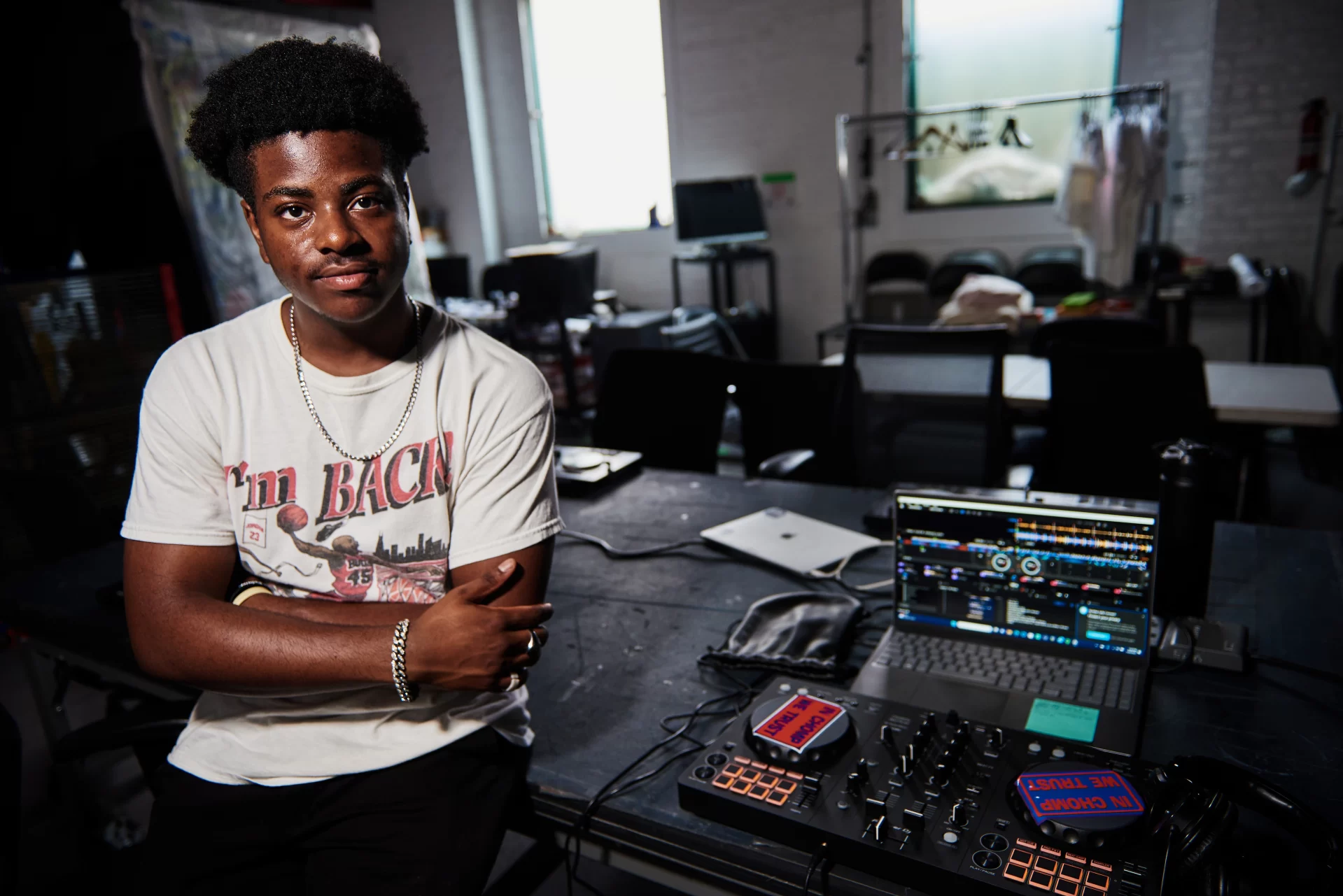
But, as Ringo Starr sang, “it don’t come easy.” Anyanwu agrees. “You have to be willing to educate yourself and be open-minded to new possibilities.” Anyanwu has musical skill as a recording artist who performs professionally as Uche the Chomp Man, and as a DJ. But, as he is rapidly learning, so many other skills come into play in the music industry, from event planning to networking and leadership. Appreciating the need for such skills has “helped me in my own personal journey to becoming established within the music industry.”
As he heads into his junior year at Bates, Anyanwu says he’s “more motivated to use what I learn in the classroom and apply it — whether it’s concepts or organizational skills.”
Student: Lydia Barker ’25, a psychology major from Wellesley, Mass.
Place and Purpose: Boston College’s Infant and Child Cognition Lab, headed by Sara Cordes, as a research assistant
The Job: Focusing on creating stimuli for new studies, running families through studies on both Zoom and in person, coding, recruiting participants both online and in person, and writing literature reviews. Supporting the lab’s research on understanding how infants, children, and adults keep track of quantity and how social contexts influence math learning.
The Story: Barker worked with a Boston College lab over the summer, but that doesn’t mean she was in a lab every day.
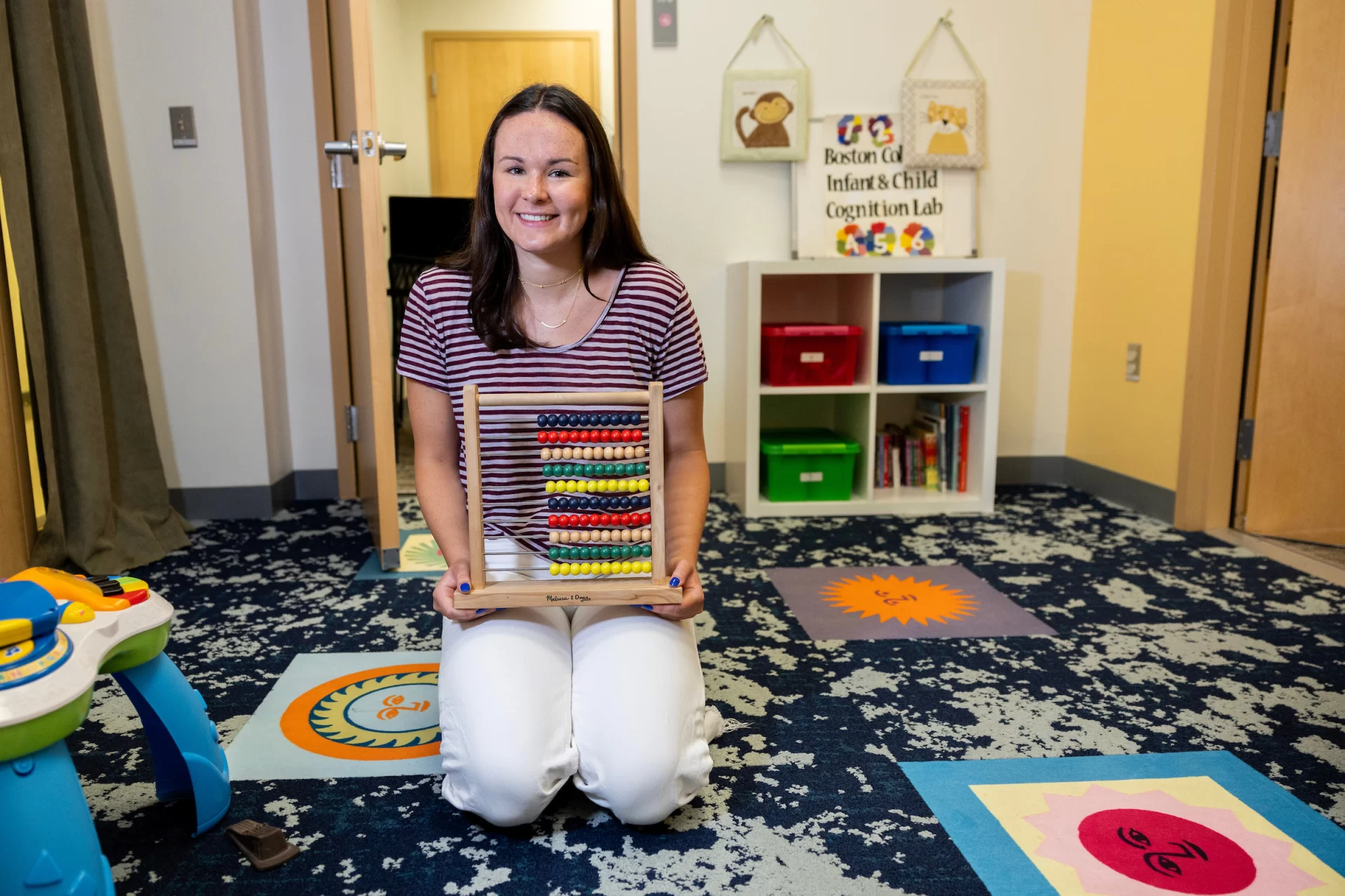
Many days would find her out and about, either nearby on the Common or the Museum of Science, or an hour’s drive west of the Hub Discovery Museum in Acton.
“As research assistants, we were responsible for recruiting families for our studies, running studies, and inputting data,” she explained. “On these off-site testing days, I was challenged to communicate effectively with families and participants, troubleshoot, and maintain professionalism while representing Boston College as well as Bates.”
As she rounded the learning curve, Barker “learned a lot about how to communicate and collaborate with both colleagues as well as participants and families through this experience.”
In collaboration with other labs at Boston College, the Cordes lab held professional development workshops, giving Barker a chance to hear from scientists at every stage of a researcher’s career: “grad students, post docs, and professors and hear about their current research, their professional experience, and graduate school. I learned what professional opportunities are available to me for the future and to build my professional network.”
Having gained hands-on, collaborative research experience, Barker sees potential for her to “fully understand how the classes I am taking apply to research and academic work.”
Students: Aaliyah Moore ’24, an Africana and politics double major from Phoenix; Jack Lawrence ’24, a politics and sociology double major from Rockport, Maine; Emma Rippey ‘24, an Africana and philosophy double major from Chevy Chase, Md.; Perry Beckett ‘24, a philosophy and politics double major from Miami Shores, Fla.
Place and Purpose: Kellogg Hansen law firm in Washington, D.C., summer interns
The path toward many professions is often prescribed. To become a physician, one must take a specific set of courses. Then there’s the law.
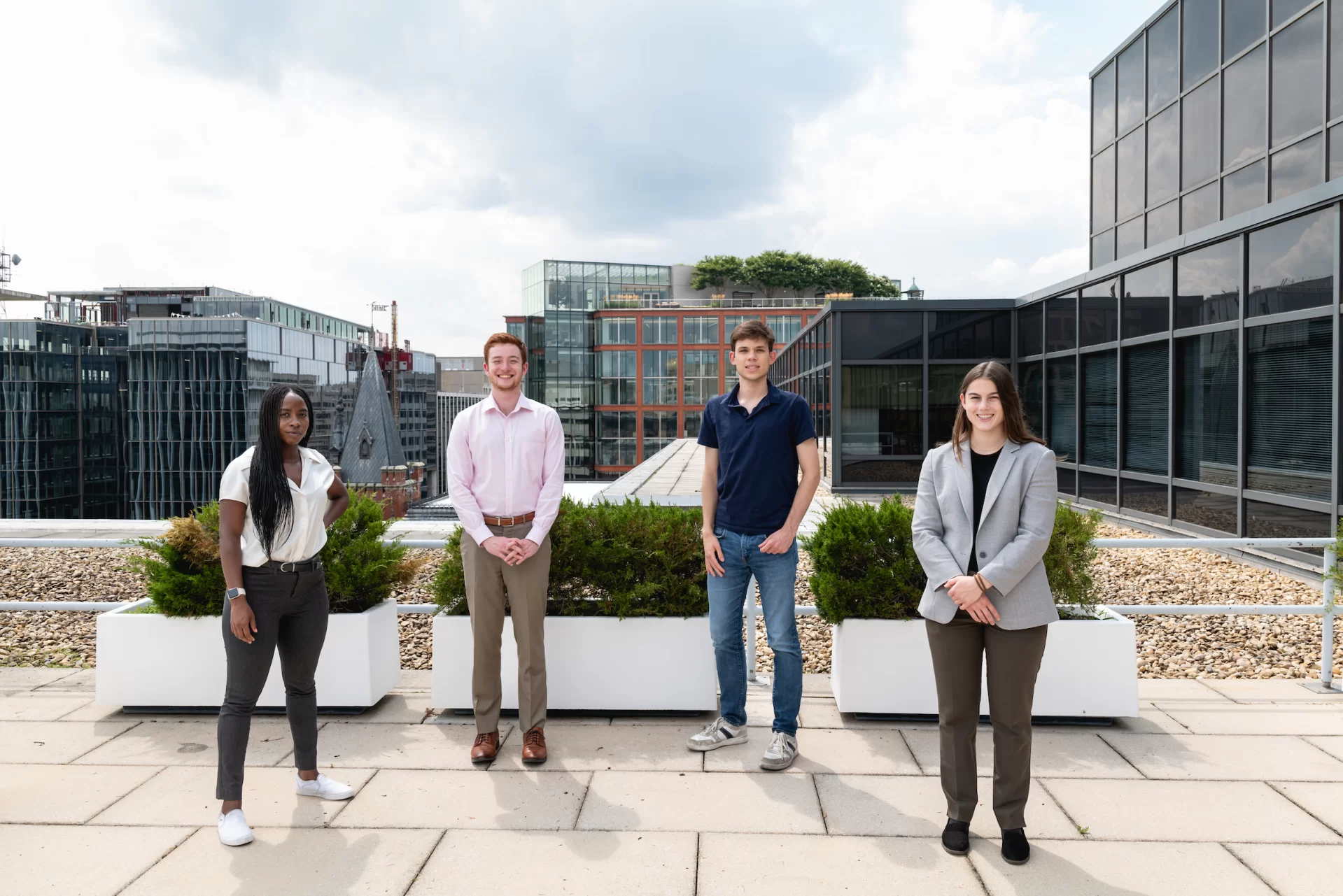
For the Purposeful Work interns at the law firm Kellogg Hansen, which specializes in complex trial and appellate litigation, the summer experience underscored the myriad paths to becoming a lawyer. “And everybody takes different paths,” says Emma Rippey ‘24, who shared the four interns’ experiences on the behalf of the group.
The Story: The interns agreed that their internship has “provided us with educational insights and experiences into the practice of law, building on what we learn in classrooms at Bates.”
Day-to-day work included reviewing and summarizing legal documents to help attorneys with cases pending trial. “We regularly participate in speaking, writing, acting and mock trial workshops.” Along the way, the interns were given access to employees at the firm. “We had the opportunity to learn from employees at the firm such as assistants, research analysts, current law students, associates, and founding partners.”
The interns saw the importance of feeling purpose in their future careers. “The best way to have a fulfilling career is to love what you do and to be happy to go to the office every morning.”
Student: Lucy Whitelam ’26, a prospective dance major from Reading, Mass.
Place and Purpose: Bates Dance Festival, Bates College, as a dance student
The Job: Learning dance with the BDF’s Professional Training Program.
The Story: “The past three weeks have been an amazing and transformative experience,” said Whitelam said in early August, describing what it was like taking classes with the summertime Bates Dance Festival’s Professional Training Program.
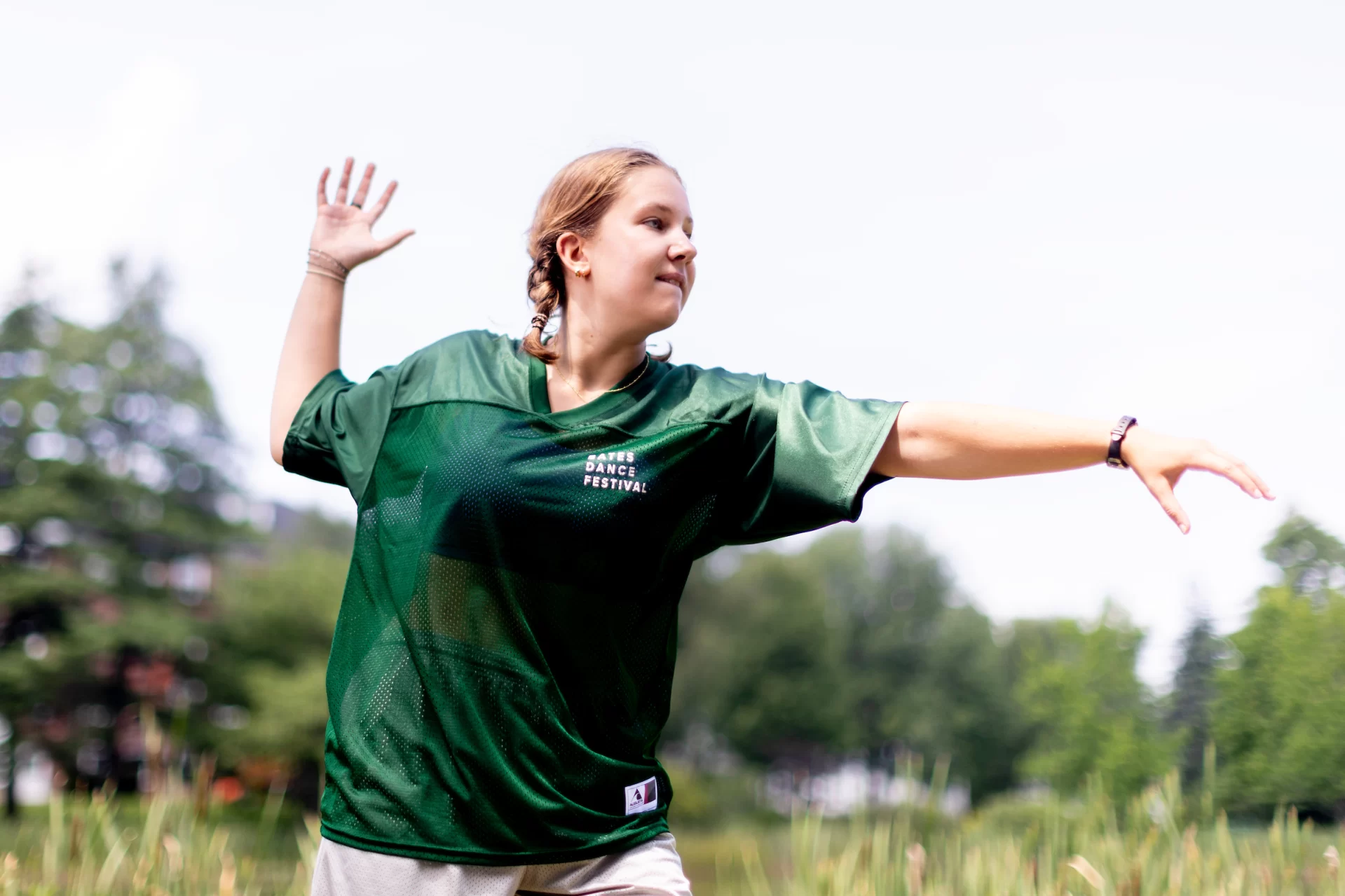
Over the course of the program, Whitelam began each day with a hip-hop class taught by BDF faculty member and choreographer Duane Lee Holland Jr. in the Gray Athletic Building, and joined by BDF faculty member Akili Jamal Haynes, aka Chibuzo Dunun, a composer and multi-instrumentalist.
After completing her first year at Bates, Whitelam was eager to expand on the dance training she received during the academic year.
Unsure at first what to expect, she’s found that everyone she’s met at the festival shares their “whole selves. I feel very lucky to witness all that they have to offer.”
All of the participants and staff genuinely wanted to see others succeed, she said, and she’s grateful she was surrounded by so many people who pushed and inspired one another.
She’s enjoyed many experiences: receiving help from other dancers to learn a challenging step, breaking out into dance on the Quad, or enjoying moments of connection outside the classroom.
As a member of Bates’ hip hop club, 2BEATS, Whitelam’s looking forward to sharing what she’s learned with fellow club members when they reconnect in the fall.
“Hip hop at BDF has been incredibly fun and joyful,” she said, “and I have loved getting to groove with the other members of my class, watching us all grow and learn together. Duane has created such a supportive and energetic class environment.”
In addition to learning hip hop skills, students in Holland’s course receive an introduction to theory, practice, aesthetics, and historical foundations of hip-hop dance.
_______________________________________________________________________
Students: Kendall Jones ‘25, a biochemistry major from Plymouth, N.H., and Sebenele Lukhele ’26, a prospective biology and economics major from Manzini, Eswatini
Place and Purpose: Bates College as summer interns with Admission
Their Story: In simple terms, the job of the Admission office is to tell the Bates story to prospective students.
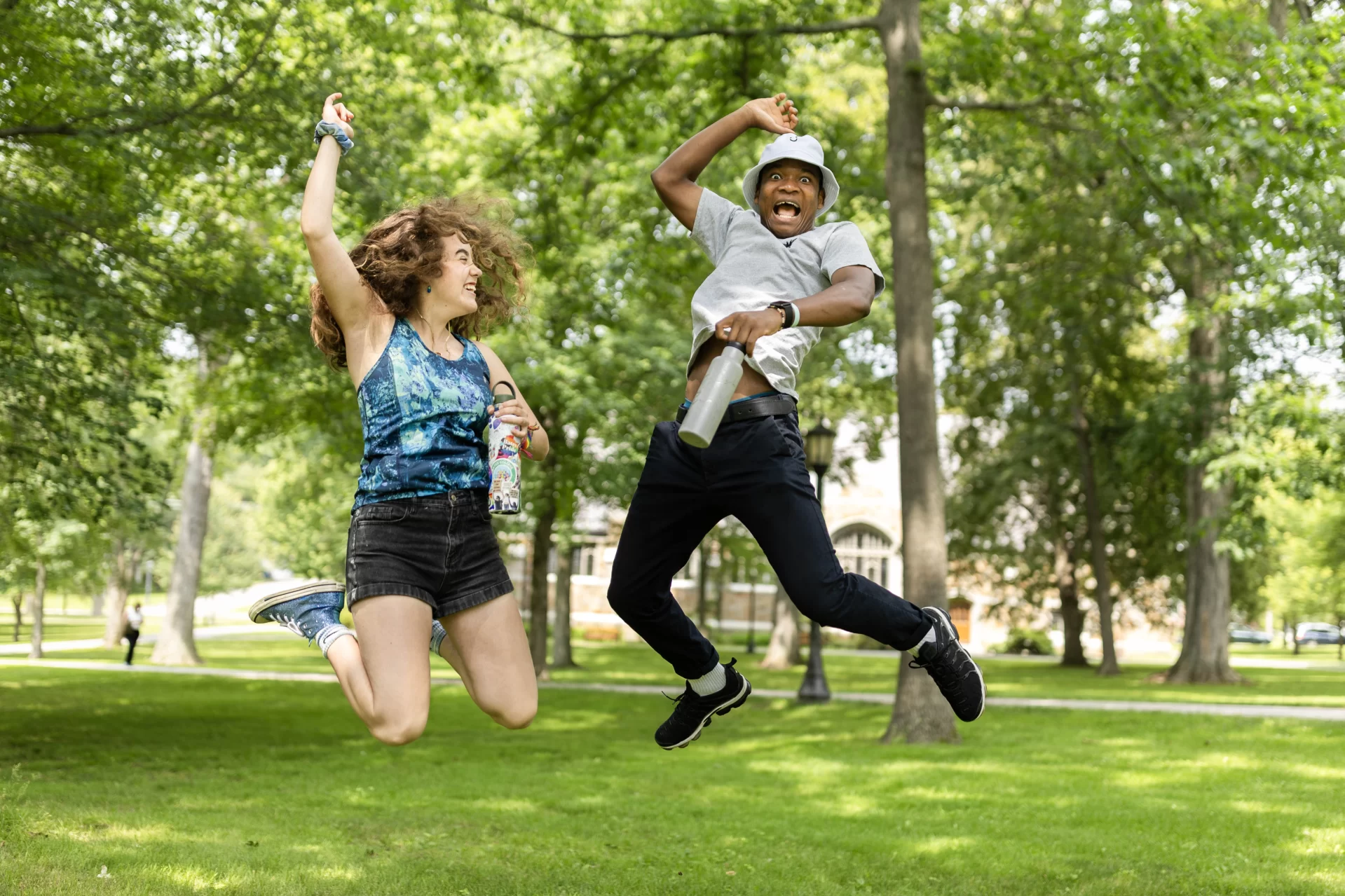
This culture of storytelling and community aligns with Jones’ aspirations. “Admission is really about stories and learning about one another. That’s a culture that I want to be around for years to come.”
Jones’ fellow summer intern Lukhele discovered that leading campus tours and information sessions and meeting people from around the world helped to cultivate valuable interpersonal skills, an invaluable asset for an aspiring medical doctor.
“I felt immense fulfillment in helping everyone, each with different needs and perspectives, and helping to reduce the stress that comes with the challenge of choosing a college.”
With that fulfillment came a sense of purpose. “Purposeful work for me would be an occupation — medical doctor — that involves working directly with people and guiding them to the best path they can take in their lives.”
For Jones, the summer had an earlier chapter. In June, as a biochemistry research assistant in the lab of Visiting Assistant Professor of Chemistry and Biochemistry Lydia Pazienza, she delved into the intricacies of RNA and metal complexes, navigating scientific articles, procedures, and hands-on lab work. “I gained new research skills and a huge amount of confidence,” she said.
Jones found that giving 50-minute tours taught her to be a concise communicator. “Anyone who has met me can tell you that I am not a concise speaker! Working in Admission has really challenged me to learn to tell stories and convey information using less words but still delivering the same impact. As in all of my Bates courses — biochemistry or theater — we are expected to do presentations and I feel I will be far more engaging of a presenter going forward.”
Student: Naomi Lynch ’25, an environmental studies major from Farmingdale, Maine
Place and Purpose: Worked with youth as an intern at St. Mary’s Nutrition Center, Lewiston
The Job: Helped maintain various community gardens in the Lewiston-Auburn area and assisted in the food pantry to help the center strengthen community connections, nurture a sense of place, and facilitate a deeper commitment to equity.
The Story: Lynch found teaching youth gardening skills to be difficult and gratifying.
Keeping youth focused while gardening was a big challenge. At times, she was drenched by the hose while the youth watered the garden. One time, she was even caught in a dirt fight. In the end, she left feeling accomplished and more confident in her ability to spread a love of gardening.
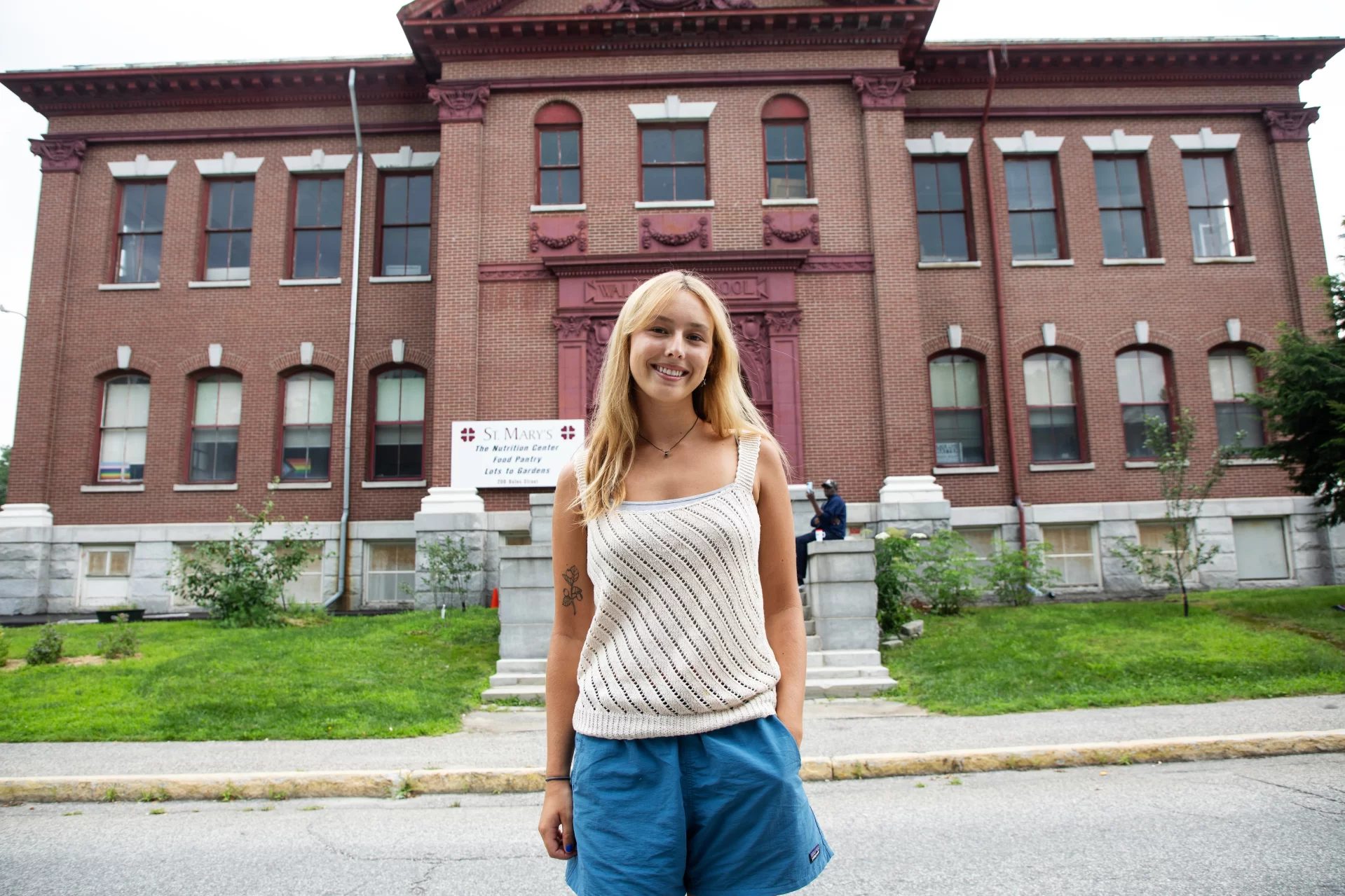
“At first, planting seeds and pulling weeds did not intrigue them. It was only after we made games and got them to pay attention that you could see the excitement on their faces,” Lynch said.
An environmental studies major with a focus on the humanities and human culture, Lynch sees direct connections between her internship and her studies. “Definitely, in almost every way — not only just through the obvious like gardening and connecting with nature, but to to provide people with healthy, nutritious food and giving people the autonomy to create their own food.”
The experienced shifted Lynch’s perception of what purposeful work could be. Her past internships were focused strictly on ecology and nature, which was rewarding.
But the opportunity to help people in need, for Lynch, proved “beyond anything I felt before.” She finished her internship feeling closer to her community and more confident in her academics and in her ability to build connections with others.
“The combination of helping community members through nature has been a spectacular experience of meshing my two purposeful interests into one,” Lynch said. “It has also influenced me to start looking at classes around food systems/sovereignty after seeing the importance of both in my work this summer.”
Student: Benjamin Morse ‘25, a biology major from Sunderland, Mass.
Place and Purpose: Gulf of Maine Research Institute, Portland, Maine
The Job: As a Purposeful Work intern at the GMRI’s UMaine’s Pelagic Fisheries Lab, Morse extracted, documented, and processed Atlantic bluefin tuna otoliths in order to prepare the otoliths for aging and to help biologists determine the stock of origin of bluefin tuna using microscopy and isotopic chemistry techniques.
The Story: As a biology major with a pre-med focus, Morse aspires to practice rural medicine. His experience this summer collaborating with fishermen and the fishing community in Maine solidified that desire, even though it wasn’t in the field he expects to pursue.
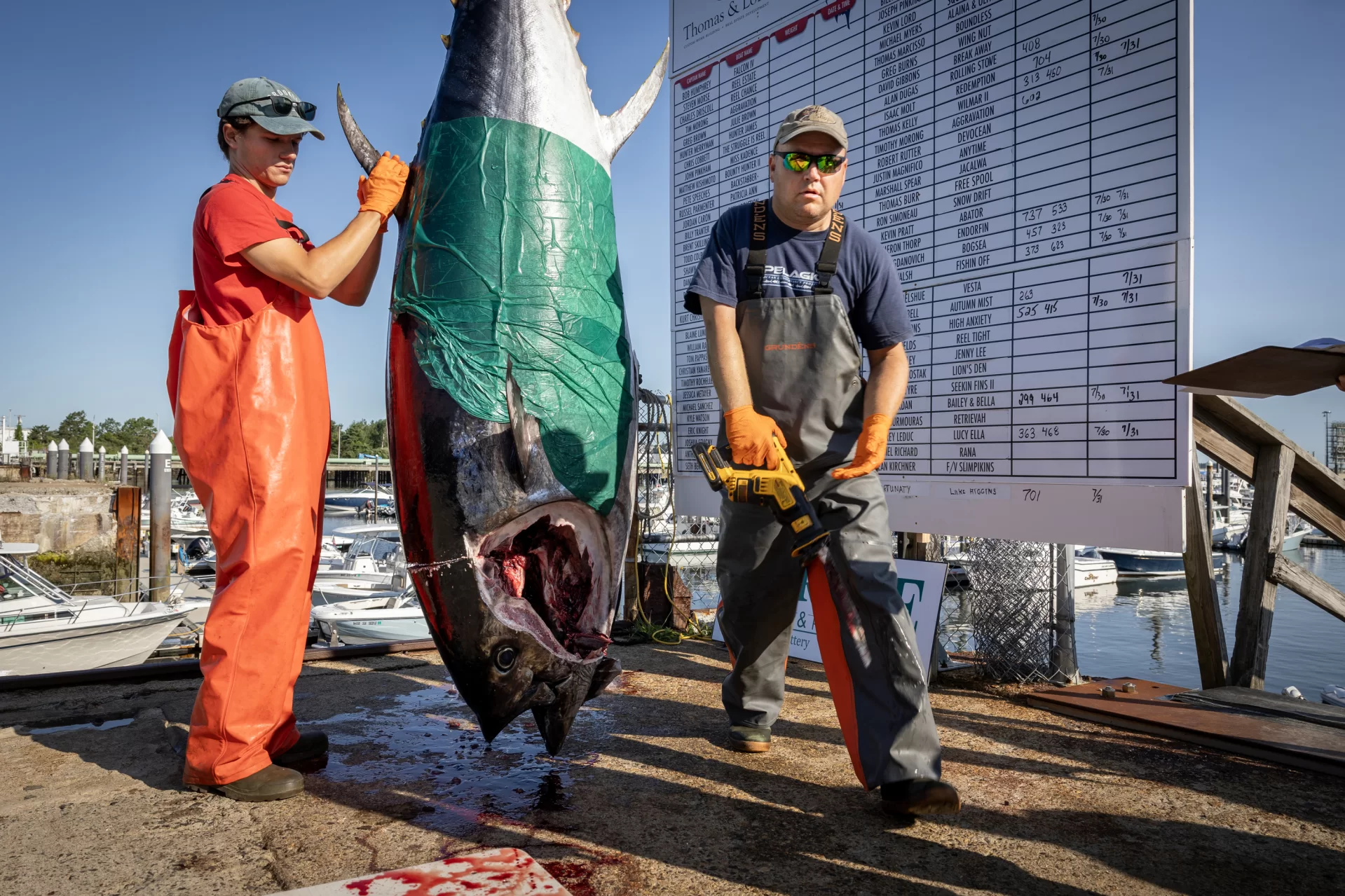
Morse said his internship this summer gave him a sensitivity and sense of empathy for the communities he might serve in the future.
“Many rural jobs require long days and labor-intensive work, fishing included. I’m familiar with this kind of work because I grew up with my dad’s landscaping business right next door to my house and worked for the company for multiple summers,” Morse said. “This work can be both physically and mentally taxing and does not allow for down time. Therefore, rural medicine needs to be sensitive to the economic restraints of small businesses while being attentive to the health outcomes that may result from this type of work.”
Morse also found the internship purposeful because he said his work contributed “to human, organismal, and environmental health,” and he helped to contribute to the sustainable management of one of Maine’s biggest industries.
“Tuna supplies a healthy source of protein and Omega-3 fatty acids to those who eat it, as well as a much-needed pay day for those who sell it. Therefore, this internship has given me real world experience in the reliance of human health on the health of another species,” Morse said.
